#ultimate lg solidarity......
Text
Side note; but intersectionality will always be important to me. Like I have so many identities that are stereotyped so badly and whenever I join a community I know that one of them will be brought up in a negative way. I will always identify as an intersectional feminist because I know that even though I may be in a community with people that are similar(LG(BT)+/Black/Muslim/Feminist community/etc) I still can’t trust them to be normal about other parts of my identity. Every single time it’s “Okay, they’re normal about X identity but are they normal about Y identity?”
As an African-American and a Muslim (non-practicing but still 🫶🏾) , I can’t trust people in the LGBT+ community to be normal about me due to their rampant racism and Islamophobia that they try and mask with the “all Muslims are angry homophobic barbarians so I have a right to fear and dislike them :(((“ stereotype. I can’t trust them to not be antiblack and speak over or ignore or tone police black people in community. I’ve seen how vile and disgusting white queers become towards queer Muslims and how similar they act towards conservatives. Rather than educate themselves they continue to perpetuate stereotypes about us and exclude us from the community. Do you know how honest to god tiring, depressing, and rage-inducing it feels to see people comment “you would get stoned to death for that” in response to queer Arab Muslims for just existing?? All of a sudden they forget about all the anti-LGBT and trans laws passed this year and last. I do not feel safe around these types of people and even when I say that I get painted as the bad guy for not wanting to accept racism and Islamophobia from within in my own community (that I don’t even feel a fucking part of btw). I honestly feel no solidarity with white queers due to the creeping feeling of their racism. It’s so disgusting how I went from loving being apart of the LGBT to just seeing it as another breeding ground for antiblackness.
I get really sick and tired of being seen as black before anything else and I am tired of white queers thinking that being queer is the ultimate form of oppression that they’ll ever face. I want to be accepted as someone who is black, Muslim, bisexual, and genderfluid.
#rants n rambles#idkkkk#lgbtq community#trans community#wiggers will read this as a “I hate all white queers and the LGBT” moment.#anti blackness
11 notes
·
View notes
Photo
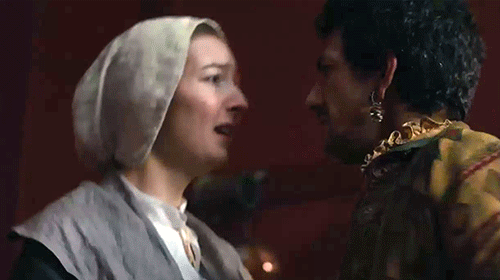
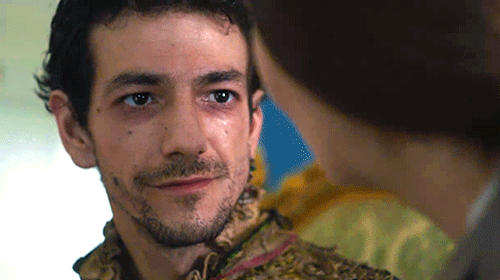
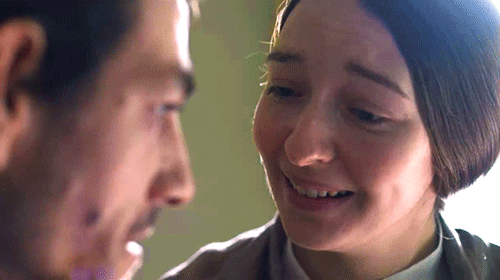
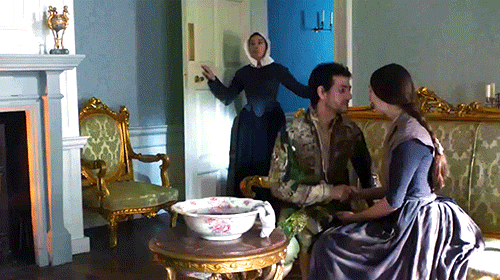
There must be some good in you, to be missed so.
#harlots hulu#amelia scanwell#prince rasselas#florence scanwell#harlots spoilers#harlots 205#friends.......#ultimate lg solidarity......#the little kiss!!#my gifs#op#harlots
965 notes
·
View notes
Text
inclus: "the LGs are so biphobic! aces understand your struggles, bis! bi-ace solidarity! get it, it's because LG people are our ultimate oppressor!"
also inclus: "but wait....if a bi person is in an m-f relationship....aren't they....basically the same....as a cishet ace??? 🤔🤔🤔🤔"
38 notes
·
View notes
Note
Have you ever got that feeling that being bisexual is like having a double life? Like you can enjoy straight things and culture but you can also enjoy from the LGBTQ+ community. Sometimes I feel like a double agent and I feel privileged in the community because there is the possibility of not being judged if I decide to date someone who has a different sexual orientation than me. I feel like I’ve been too brainwashed after reading how bisexuality is being “half straight half gay”
It’s like living in a gray zone where you feel like you have to play for either team, but you don’t identify with either of them. And I was reading some discurse in radical lesbian pages that say that we only bring trouble by bringing men into the LGBTQ+ community. It really got to me and now I question what is my position there. Sorry if I bother you with these questions, but you’re the one I’ve seen that can tackle these kind of issues sensibly.
Hey, don’t worry anon you’re not bothering me, thanks for trusting me with these sort of issues.
Bisexuality is its own sexuality and it is fully valid on its own and part of the LGBTQ community on its own, no matter who your long term partner is. You don’t have to pick a side. LGBTQ culture is yours, as much as you want it to be. Bi people have been there at its onset and still are - for instance, the woman who organized the first Pride march, Brenda Howard, was a bisexual rights activist ! Of course, there is a small but vocal minority of the community that derives their clout from wanting to exclude others (be it bi, trans, ace people…) who are not up to their purity standards. To me, this vision of community as a small set of resources to be hoarded and defended from those who are not oppressed/deserving enough is extremely damaging (and ultimately plays into the hands of conservative ppl who hate us all but love seeing us tear each other apart.) Honestly I would stay away from radical feminism shit if I were you, that stuff can be extremely toxic for bi women (and plays into super crappy essentialist visions of gender). You are not ‘bringing men into the LGBT+ community’ anyway (lol there are already plenty of men there ! trans men ! bi men ! gay men !) and even if your partner is a straight dude, I think as long as he knows how to be respectful, there is nothing wrong with that. You’re not straight, your relationship isn’t straight. The mentality of ‘us vs the rest of the world’ is often, I think, born out of trauma, and there is a lot of that to go around, but some people choose to take it out on other people instead of choosing healing. Also this idea that men are necessarily horrible dangerous people ‘polluting with their presence’ is just...bad on so many levels (women can be terrible too lmao). Having women centric spaces can be helpful and great for certain things, but the LGBTQ community should be more expansive than that. I mean - if you go that way, there are trans people with opposite sex partners too, should they not bring them to Pride either ? It’s a very slippery slope there, and it goes down to a garbage chute where we start overanalyzing each other and our sexual behaviors that starts to resemble a 19th century Puritan village which is...completely nuts, for real.
My perspective is that the more we grow as a community, the more people realize that they might not have been as straight as they think they are, the more powerful we are. You are not taking anything away from anyone or anything, you’re not polluting or invading. Your story and earnestness in love are an asset to the community. This diversity is what makes us strong and beautiful. Of course, we might be joined by people whose same sex attraction is rare, people who earlier in human history might have been closeted, even to themselves their whole lives. But this freer society is giving them the opportunity to be honest about the full extent of their capacity to love, and I think that’s beautiful. This need to draw lines can be so toxic for questioning people, too. Human sexuality is often a fuzzy, fluid, complicated thing, for a lot more people than we are willing to admit.
Besides, axes of oppression don’t only work along sexuality lines. It’s much more complex than that. And even if yes, things might be easier for you in certain respects if you are in a ‘straight passing’ relationship, and it is important to recognize that ; if you have to dismiss your sexuality, if you’re not able to be open and are pressured into sweeping a whole part of your identity under the rug, if you’re not taken seriously and excluded from a community that is important to you, then that can cause a lot of damage and mental health issues. Being bisexual is a specific LGBTQ experience which comports challenges of its own ; the insecurity and pressure to ‘choose’ is part of the burden. Not having the exact same experiences as a lesbian doesn’t make you ‘less valid’. One sign of that is that bi people are a lot less likely to be out and a lot more likely to have mental health issues, and I very much think those two are linked.
Anyway, if i have to give any advice - some parts of the LGBTQ community are shitty, esp those who play the ‘you must be this oppressed to ride’ game. But there are also some that can be wonderful. If you have the opportunity, it could be a really empowering experience to get in touch with your local, specifically bi community (it was for me), read bi focused books or stories of other people ; to help you grow your own sense of confidence in your own sexuality. My hope is that in the future, as bisexuality is represented more fully in the media and more bi people are open and further generations grow without those toxic ‘either/or’ mindsets, this damaging feeling of being double agents/having to pick a side will fade. And that we have a more distinct sense of bi pride/culture etc without being continually erased or seen as gay/straight by default.
At the same time, of course…I think it’s very much part of the human experience to navigate between social environments where the microcultures and codes are different. You don’t behave similarly with your parents and your friends, I’m sure, or at school or a party, but neither of these things are dishonest ! So there is nothing wrong with behaving a little differently when you’re surrounded by queer friends and making references to a specific culture. You’re not dishonest and you’re not in hiding, it’s just a different part of you that is coming to the front. And you can bring your own bisexual self and experiences to LGBTQ spaces, as well, to make it richer and more diverse. If you can’t…that’s a bad sign.
And finally…living in a ‘grey zone’, a more liminal space, can be a wonderful thing in itself ! It’s sort of amazing to be able to be attracted to people no matter what their gender is, don’t you think ? Or to be attracted to different genders in different ways ? I actually think it’s really fucking cool to be bisexual. Despite the stigma and the headache it is, often, I wouldn’t change it for the world. It can be such an exhilarating experience realizing you don’t have to reproduce heteronormative patterns in your life, that you can find similar things attractive across genders, or not at all… I just find it so interesting and so freeing. Especially since as women we are given such a narrow view of what we are supposed to find attractive and how to be attractive and how to do relationships. And to me being bi just helped blow that shit up sky wide. And it allows us to stand in solidarity with other minorities who are not always given their space in LGBTQ spaces. Honestly, the few bi spaces I’ve been in were so much more open, making efforts to be accomodating to people with disabilities issues, were so much more diverse in terms of gender/class/race/culture/body type etc…I’m not saying all bi spaces are inherently superior but I feel like bi people, at least those i’ve met, are often more prone to think about those questions and it’s been absolutely delightful. Because we understand what it’s like to stand at an intersection and not feel entirely part of something, and so we want to foster spaces where people can be themselves in all their myriad identities, and that this feeling of ‘being at a crossroads’ can be so rich and beautiful.
I hope you can find that same sense of pride and certainty in yourself. Of course, it’s not always going to be easy, and I understand these doubts. You are definitely not alone with them. I mean, we say we don’t have to choose, but we do have to make choices in where to look for partners, for instance. I hope you can listen to your desires without crowding them out with pressure from outside, and follow your heart where it leads you.
2 notes
·
View notes
Photo
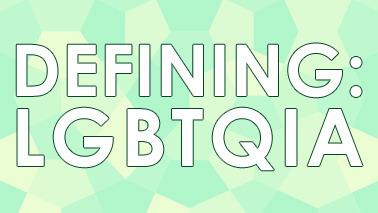
Defining: LGBTQIA
By Kara Kratcha
Welcome to another installment of our “Defining” series, where we unpack various terms and identities. Do you have a word that needs defining? Let us know!
Define It:
Ah, that acronym.* Sometimes called “alphabet soup,” the long and often-changing list of letters used to describe non-straight, non-cisgender identities frequently befuddles brains and ties tongues. Before I go any further, let me break it down for you:
LGBTQIA stands for Lesbian, Gay, Bisexual, Transgender, Queer/Questioning, Intersex, and Asexual/Aromantic.
If you’re not sure what any of these individual words mean, I highly recommend you click on the link for that word and read the previous Defining entry. If you’re new to this LGBTQIA thing, then I recommend you read the entries for the letters after “LG” even if you have some idea of what they mean. I bet you’ll learn something or at least get to consider a new perspective.
Explain It:
There’s no denying that the acronym is clunky, so why do we use it? Although LGBTQIA can be a mouthful, it gives us a way to describe our community in its broadest sense.
Actually, in my experience, the “LGBTQIA community” is more like a group of loosely affiliated communities that sometimes band together out of solidarity, similarity, or necessity. Each LGBTQIA experience comes with its unique challenges and joys. However, lesbian, gay, bisexual, transgender, queer, questioning, intersex, and asexual/aromantic people all have something in common: we experience gender or gendered attraction and relationships that fall outside the norm. At our best, lesbian, gay, bisexual, transgender, queer, questioning, intersex, asexual, and aromantic people are specially equipped to help each other out, build each other up, and affirm each others’ experiences.
“LGBTQIA” is not a perfect way to describe the affiliations of non-straight, non-cisgender people across identities, and it’s also not definitive. Some people just say “LGBT,” or “LGBT+” if they want to be inclusive but not type or say so many letters. Others argue that the acronym should be longer, often including a “P” to stand for pansexual or sometimes polyamorous, or another A to stand for aromantic or agender.
Still others, myself included, prefer to use “queer” as a broad umbrella term for all of these identities and more. I prefer to call myself “queer” rather than “LGBTQIA” because it is both more accurate and more inclusive. I could accurately say that I am a nonbinary, non-monogamous person on the asexual spectrum with an interest in people of all genders, but that’s honestly more information than I am usually comfortable sharing and more identities than I usually care to explain or justify. Instead, I often just tell people that I’m bisexual since it requires less explaining, but “bisexual” does not capture my full experience. There is very little language available to me that allows me to quickly convey that I don’t identify as precisely male or female, and often I don’t want to out myself as nonbinary for this reason. And that’s not to mention all of the rest of my, well, queer identities! For me, “queer” communicates all of my gender and sexuality experiences in a way that “LGBTQIA” does not.
But “queer” doesn’t work for everyone. Some straight trans women and straight trans men do not identify as queer because they view “queer” as a word related to sexuality rather than gender. For example, a woman who was assigned male at birth and is only attracted to men is a straight woman and may not identify as queer. At the same time, some LGBTQIA folks do not want to be referred to as “queer” because of its history and sometimes continued use as a slur. All of us, LGBTQIA people and allies alike, should respect how each person wishes to be identified by listening carefully to individuals about their experiences and preferences and then using the language that reflects those preferences.
It seems likely to me that the way we talk about ourselves as a community with many different genders, sexualities, and experiences will continue to evolve. As a person whose identities tend toward the neglected or altogether unnamed part of the LGBTQIA acronym, I do often feel alienated from the community as a whole. Still, I appreciate that we are striving to find language that invites all of us in. Ultimately, that is what we hope to do when we string together all of those letters.
Debunk It:
• The “A” stands for “ally.”
Straight and cisgender allies can play excellent supporting roles in LGBTQIA communities and activism, but it is important to remember that allies are not the stars of the show. Asexual, aromantic, and agender identities are forgotten enough without allies claiming the small spotlight of that final letter.
• Intersex, asexual, or aromantic people don’t really belong in the acronym.
If a person feels they are part of the LGBTQIA community, then I believe that person should be welcomed and allowed to explore. Intersex, asexual, and aromantic people experience gender, relationships, and attraction that do not match up with the straight, cisgender norm, and many therefore want or need to participate in the community. We make great advocates and friends, and we need camaraderie and support too.
Plus, every time someone claims that the IA’s don’t belong, that person may well be preventing someone with multiple LGBTQIA identities from feeling safe enough to fully come out to their peers. It’s difficult to feel closeted with other LGBTQ people because they are not accepting of all of your identities. Remember, it’s very possible to claim more than one letter! In my experience, it’s extremely common.
• “LGBTQIA” is always the most appropriate way to refer to a non-straight, non-cisgender person or group of people.
Not every non-straight, non-cisgender person or group of people identifies as lesbian, gay, bisexual, queer/questioning, intersex, and asexual/aromantic. Often it is more appropriate to refer to a person or group of people by their specific, relevant identities. If you mean gay men, say gay men. If you mean trans people, say trans people, and so on. Don’t say LGBTQIA or even LGBT if you have not considered the experiences of TQIA people in what you’re saying or writing. Lumping all LGBTQIA experiences together when you are in fact only talking about a specific group or identity can make people with lesser-known identities feel more erased, not less.
• “But that’s too many letters and corresponding identities to remember!”
I feel you, but putting in the effort to learn about identities that are new to you will make it a lot easier to communicate with and validate your queer and/or trans family member. Besides, the best thing you can do for a loved one who you are trying to understand is ask thoughtful questions and then listen carefully to that person’s answers. Ask questions like, “How do you identify?” and “What does that word mean to you?” The actual person you want to learn about will be able to tell you much better than some definition on the internet.
*Yes, I know that it’s technically an initialism. Don’t @ me, fellow word nerds.
Be sure to check out the rest of The Defining Series right here!
***
Click here to read about our brilliant contributors!
66 notes
·
View notes